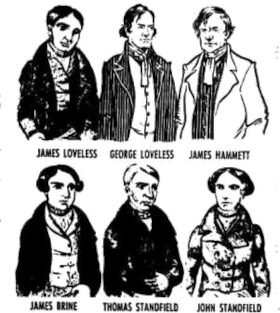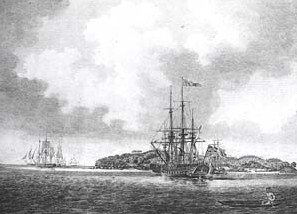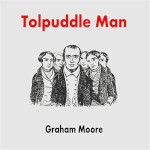FolkWorld #77 03/2022
Dai Woosnam's DAI-SSECTING THE SONG
Road To Dorchester - by Graham Moore & Mick Ryan
Before I tell you about the song I have selected as the twelfth one to go under the Dai Woosnam microscope, let me preface this article with what has now become part of the wallpaper in this series: if you like, see the following four bullet points below as being akin to the “small print” in this contract between you the reader, and me the writer. Here goes...
It is a given that I might be talking total balderdash. After all, I have no monopoly on the truth. And even when my insights are proven correct, that does not stop you dear reader, from finding your own views to be totally antithetical to mine. But here is my news for you... we can both be right.
As Bob Dylan famously wrote “You’re right from your side/I’m right from mine”. And (much less famously) exclaimed in a press conference on his first full tour of the UK, when asked the meaning of a particular song... “My songs mean what they mean to YOU... man!”.
So don’t please write in vituperative language to the Editor to tell him that Dai is, to use the familiar English phrase, “barking up the wrong tree”. I might well be. And certainly every line of my views here are not endorsed by the Editorial Board of FolkWorld. Nor should they be.
Why have they hired me? Not sure. But my dear wife Larissa suggests it’s perhaps because they like the sound of my barking. I must say, I cannot top that conclusion...so I will end my preamble here, and get down to business.
The eleventh song saw us cross The Pond, and focus on the vast injustices done to the indigenous tribes of Native Americans. For the twelfth, we return to England (where I am based), and this time focussing on the vast injustices done to the English working classes in the 19th century.
Before I get started on this remarkable song, I need to give the general reader some vital historical background, because 99% of non Brits reading this will not know of the precise events behind the song: and I regret to say that a sizeable proportion of my fellow Brits will only have the vaguest notion about the facts and the cruel treatment underlying the story of the ‘Tolpuddle Martyrs’. So let me attempt to summarise one of the most famous events in the history of industrial relations in Britain.
England had just entered the 1830s, yet in many ways the agricultural labourer might just as well have been living in the Middle Ages, such was the feudal grip his employer had on him. The bosses insisted on being addressed as ‘master’: the same deferential form of address that American slaves used when speaking to their inhuman ‘owners’. Of course there can obviously be no comparison between the plight of both groups, since the English peasant class were paid (albeit, barely a subsistence wage) and were not routinely flogged within an inch of their lives. And the biggest difference of all, was that they were indeed free to leave their employment: although this was a curious form of ‘freedom’ in that it was another way of saying ‘you are free to starve’...!!
Now, to set the scene: it is the early 1830s and the Swing Riots had broken out in Southern and Eastern England. These were protests by agricultural labourers against increased mechanisation and low wages. The Ruling Class – mindful of the revolutionary events in Paris that had occurred very much within living memory – decided to crack down hard on the rioters.
In Tolpuddle, a little village 8 miles to the east of the Dorset county town of Dorchester, the labourers had not resorted to violence. Instead they negotiated a commitment to increase their pay to the (hardly generous!) level of labourers in some nearby villages. But alas their Tolpuddle masters reneged on the deal, and what was worse, quickly over stages, reduced their wages by 30%.
So, in order to stave off starvation - which would have resulted if their wages were to drop a further shilling – local men, led by George Loveless, attempted to form a trade union. Now, in 1833, such a thing was strictly illegal: it was to be nearly 40 years later before they became legal in Britain, following The Trade Union Act of 1871.
But in the early 1830s, such a decision was seen by the authorities as close to treason, and six men were made to walk from Tolpuddle into Dorchester, to face the sternest of judges - Judge Baron Williams - at Dorchester Assizes in March 1834. Their fate was sealed. And in Sir John Williams, they met a judge determined to teach them a lesson, so as to discourage copycats.
He was a ruthless judge, coincidentally a bit of a throwback to another judge who was synonymous with Dorchester: viz... Judge Jeffreys who came to Dorchester for the 'Bloody Assize' after the Monmouth Rebellion in 1685.
And as this song hints at, but doesn’t quite spell out, the men were dealt with severely: they were sentenced to be transported in chains to become true slaves for seven years in Australia.
Five of the men were landed in Sydney, paraded in shame through the streets, and deliberately split up and allocated to different slave owners in various parts of New South Wales... to be worked to exhaustion in harsh conditions and given a very poor diet. (I commend to you the Robert Hughes magisterial account of early ‘transportation’ Australia – The Fatal Shore – which is an epic book which spares none of the gory details.)
The sixth ‘mutineer’ - as they were shockingly called - George Loveless, had a different fate. Maybe because he was ill on arrival in Sydney, but just as likely, perhaps because he was their leader, he ended up being taken on to Van Diemen’s Land. And that of course was just about the most feared penal colony of them all, so much so that in 1856, the name of the island was changed to Tasmania, not least for public relations reasons, since the former name was too redolent of incredibly harsh treatment of prisoners.
Fortunately the men had to endure this hell for just four years, because in 1838, the British Ruling Class gave-in to public outrage, and the men quite properly got a pardon. Only one came back to live in Tolpuddle: most of the others got on a ship to New York City, and ended up in Ontario where they lived productive lives.
Now, please read the lyrics: the verses were written by Graham Moore, and his buddy Mick Ryan came up with the splendid chorus...
Road to Dorchester
Songwriters: Graham Moore & Mick Ryan
Six brave men we've read your story
The trial the grief the pain and the glory
At the hands of the Squire the Whig and the Tory
In England's pleasant land
But if I could ask you one last question
One last thought for your reflection
Did you lose all hope, pray for protection
On the road to Dorchester.
Chorus:
On the road - on the road
By the masters of oppression you were taken from your land
On the road - on the road
The immortal power of freedom took you by the hand
Did you wake with a dread in the dark day dawning
Did the sun force a way through the clouds of the morning
Was the lark on the wing above you soaring freely in the sky
What thoughts did you share what fears were growing
Did you think you'd be home 'fore the cock was crowing
Did you think of the land where you'd be going
On the road to Dorchester.
Chorus:
On the road - on the road
By the masters of oppression you were taken from your land
On the road - on the road
The immortal power of freedom took you by the hand
As you crossed Grey's bridge with the jail ahead
Past the spire of the church, the graves of the dead
Did you feel regret for the things you'd said
The oath that you had sworn
Were you sure in your heart that your cause was right
Were you firmly resolved to stand and fight
For the right to resist the master's might
And for children yet unborn.
Chorus:
On the road - on the road
By the masters of oppression you were taken from your land
On the road - on the road
The immortal power of freedom took you by the hand
That road was trod before you came
And since you've gone it's been trod again
In trial and grief, glory and pain
In England's pleasant land
The road's still there and so's the town
Where you stood for your rights, and your renown
Is there on the road that you walked down
The road to Dorchester.
Chorus:
On the road - on the road
By the masters of oppression you were taken from your land
On the road - on the road
The immortal power of freedom took you by the hand
Stirring stuff, eh? Particularly when delivered by Mick Ryan here (with Paul Downes on guitar and harmony vocals) at Whitby Folk Festival...
Full marks to them for a wonderful live performance. The lyrics of course are largely self-explanatory: verses with great use of rhyme that pound like waves against the shore, and a chorus so strong that it makes you feel that by comparison, The Internationale is an anthem just for wimps.
As someone who has worked in Dorchester and knows the place, I can tell you that should you visit, enter from the north east, and sing the opening lines of the third verse under your breath.
As you crossed Grey's bridge with the jail ahead
Past the spire of the church, the graves of the dead
For you can indeed still cross the River Frome by the quaint old stone Grey’s Bridge to enter the town (it is on the road from Tolpuddle, i.e. the London to Dorchester road). And you will soon come to the jail, where they held the men prior to their transportation, and where incidentally they were still hanging women in public outside the gates as late as 1856, and men even later... and so I guess we should be thankful for small mercies that the six Tolpuddle men ‘just’ received a sentence of transportation... (although methinks that Judge Baron Williams might have hanged them had that punishment been on the statute book for their ‘crime’...!!). And as you approach the jail, look left and you will see the very same spire referred to in the song... that of St Peter’s Church.
I once met Graham Moore at a gig of his, and we talked of a possible profile of him I proposed to write for a leading print magazine. We could not hear ourselves over the background din, so I suggested we repair to the relative tranquility of my car parked outside.
There I told him of my enthusiasm for this particular song. And I recall him making a sardonic observation that the authorities (via the police constable) made the men walk all eight miles to meet their doom, but were happy to give them a free passage ten thousand miles to Australia...!!
And let me leave you with Graham himself. Nobody quite sings the song with his brio: he takes no prisoners. And tremendous though Paul Downes was with Mick (above), the cello here gives the song an extra oomph somehow.
Enjoy...
Dai Woosnam, Grimsby... 23/02/2022
dai.woosnam@folkworld.eu
Photo Credits:
(1) Dai Woosnam,
(2) Tolpuddle Martyrs,
(3) Botany Bay,
(4),(6) Graham Moore,
(5) Mick Ryan
(unknown/website).
FolkWorld - Home of European Music
 Layout & Idea of FolkWorld © The Mollis - Editors of FolkWorld
Layout & Idea of FolkWorld © The Mollis - Editors of FolkWorld





